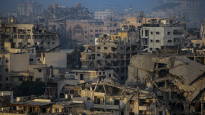Israel said yesterday, Sunday, that its forces have advanced to the Gaza coast and cut the Gaza Strip into two parts, north and south. Gaza City had already been blockaded by Israel before.
By cutting off the Gaza Strip, Israel aims to fragment the region and prevent Hamas from sending additional troops from the south to the north. This is how the lieutenant colonel assessed Juha Mäkelä From the Defense Forces Research Institute.
Now, according to Mäkelä’s assessment, Israel is slowly starting to strangle the blockade of Gaza City and penetrate into the city. So the war moves to the next stage, i.e. the urban war.
– Then we fight in population centers. It’s slow and time-consuming, and certainly the loss figures on both sides will also increase, says Mäkelä. It becomes more difficult for Israel to attack, and the forces try to take over the city block by block.
Moving to urban warfare will change Israel’s position. While Israel was still building its blockade, it was able to take advantage of its military technological superiority, such as tanks, helicopters and drones.
– Now, when we start entering the city on narrow streets, where the buildings provide protection for the defender, progress can no longer take place in armored vehicles. The infantry have to go there first to feel out the targets to be destroyed, says Mäkelä.
According to Mäkelä, the defender now has a comparative advantage, as it has been able to prepare battle bases and locations from which it can use anti-tank missiles and thus slow down the attacker’s progress.
However, he believes that the Israeli blockade ring will hold.
– However, Israel has technical superiority and has a lot of reserves, says Mäkelä.
Soldiers in the tunnels only for a good reason
It is known that there is an extensive network of tunnels under Gaza City, which Hamas has been building for a long time.
According to Mäkelä, tunnel systems mean various large spaces and command centers dug underground, which are connected to each other through narrow tunnels.
– Israel has not been able to destroy them with artillery or the air force.
The deepest ones may be up to 70 meters deep.
The Israeli army is working to clear and explore the tunnels as it progresses.
– Under certain conditions, soldiers will certainly not be sent there – but if possible, they will try to blow up the tunnels, or try to smoke Hamas fighters to the ground, says Mäkelä.
The situation is complicated by the fact that Hamas reportedly keeps its hostages in a tunnel. According to Mäkelä’s estimate, there are still around 150 hostages in the Gaza area.
– It makes the operation more dangerous. It is very possible that the tunnel network will have to be penetrated anyway.
Mäkelä does not believe that Israel sacrifices its soldiers in the tunnels, unless rescuing hostages or some other demanding task requires it.
It is clear to him that in the future in close combat the fastest and the one with more experience will win.
– It requires experience, courage and the right kind of weaponry.
Civilians may not escape the feet of war
According to US official sources, there are still about 350,000 people in the northern parts of Gaza, even though Israel has repeatedly urged civilians to leave with flyers and text messages.
According to Mäkelä, the situation of civilians is contradictory. Their departure from the north is complicated by three things.
– People do not dare to leave their homes because they fear that if they evacuate, they will never be able to return.
They are perhaps afraid that the homes will either be destroyed or someone else will take them over. Some, on the other hand, have relatives in the ranks of Hamas and want to stay and help them.
The third reason, according to Mäkelä, is that Hamas’s battles are based on the fact that it uses civilians as human shields. So you can’t leave, because Hamas doesn’t allow it.
There are several hospitals in the northern part of Gaza, whose situation has already been difficult due to, for example, energy shortages. The BBC reported that the Israeli bombardment had cut off telecommunication connections on Sunday, which is why people cannot, for example, call ambulances for help.
According to Mäkelä, the humanitarian situation has worsened since the blockade began.
– In this sense too, a humanitarian ceasefire would be necessary. Much has been said about the fact that Egypt is also not ready to open the Rafah crossing in the south and let people into the Egyptian side.
He estimates that it could help civilians if the international community continues to put pressure on it and tries to negotiate with all parties so that civilians could be evacuated from the area. He sees no other possibilities for improving the situation of civilians.
According to the Israeli military, the army continues to allow civilians to leave the northern parts of Gaza through the humanitarian corridor.
